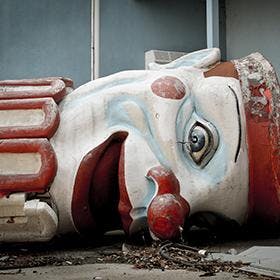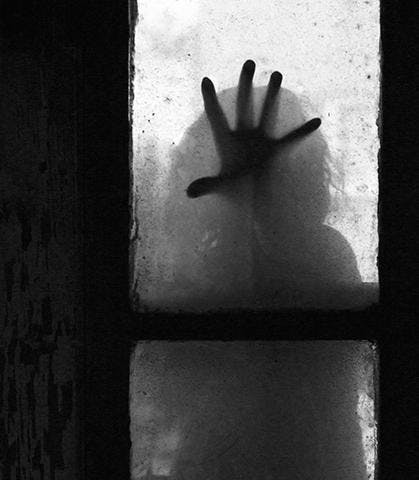WHAT ARE NIGHTMARES?

Ever dreamt you’re being chased by a faceless figure in a dark cloak? You wake up with a jolt, your heart beating and your nerves on edge? This is, in fact, a nightmare. It can be scary, even terrifying, but at least you’re not alone. Many people experience nightmares, according to Best Health Magazine, the figure is nearly 70% of adults1! Of those, 30% say that they these nightmares jerk them out of sleep at least once a month1.
So what is a nightmare and what causes it? And when do nightmares become so constant they actually become a sleep disorder? Read on to find out what can cause these scary dreams and how you might be able to stop them.
What is a nightmare?

A nightmare is a scary dream, which often wakes up the dreamer. During the nightmare, the sleeper may feel quite a few disturbing emotions including anger, guilt, sadness or depression.
Some common feelings may be terror, distress, fear and anxiety. Like dreams, what happens in a nightmare varies widely from person to person, and from night to night. A common theme, however, is when the dreamer is being chased. Adults often dream they are being chased by an unknown figure while children often dream of being chased by an animal or a fantasy figure2.
When do nightmares occur?

Sleep cycles occur and repeat at 90 - 110 minute intervals. There are two types of sleep, which are non-REM (which is divided into four stages) and REM. Usually, we begin the sleep cycle with a period of non-REM sleep followed by a very short period of REM sleep3.
In 1953, when researchers first described REM, scientists began studying sleeping and dreaming more intently. They discovered that the strange experiences we call dreams (and nightmares) usually occur during the REM part of sleep4.
Who has nightmares?
Many people will have a nightmare at one time or another. They usually begin in childhood and are considered to be normal unless they interfere with sleep or development. Reports have shown that nightmares are more common in girls than boys, and they may continue into adulthood. Sometimes, adult nightmares can be associated with stress or a mental disorder4.
What causes nightmares?

While there is no definitive cause of a nightmare, there are a number of studies that explain the possible reasons why we have them. Some studies report that people experience nightmares after they’ve suffered a traumatic event, such as the loss of a loved one, an assault or a serious accident. The nightmare is usually related to the traumatic event and can occur over and over again.
Other nightmares may be caused by certain drugs or medications, or by an illness or fever, while some people have nightmares when they’re experiencing a stressful situation like losing a job, a relationship break-up or moving2.
When do nightmares become a sleep disorder?
When nightmares occur so often that they affect social, occupational or other areas of functioning, they are considered a disorder4. This is often called nightmare disorder or ‘repeated nightmares’. When this happens, the sufferer should try to seek help from their GP or a sleep expert.
Are night terrors and nightmares the same thing?

According to some experts, night terrors and nightmares are different2. While nightmares usually occur after several hours of sleep, night terrors generally occur during the first hour or two of sleep. In a nightmare, screaming and moving about is very uncommon, and the dreamer realises soon after waking up that they’ve had a dream. With night terrors, loud screaming and thrashing about are common and the sleeper rarely remembers what they ‘saw’ or dreamt.
It’s a good idea to see a sleep expert if you think you, or your child, is experiencing night terrors.
Can we stop nightmares?
If a child is experiencing ongoing nightmares and it’s affecting their sleep or their waking hours, they may need to speak with a therapist2. The therapist may ask the child to talk about, or even draw, the nightmare. This is intended to help the child feel safer and less frightened.
When it comes to adults, ongoing nightmares may be a sign of overload1. It’s always important to speak to your GP or a sleep expert if your nightmares occur every night and they’re affecting your waking life. If you’d like to try and stop the occasional nightmare, here are a few tips that may help:
Tip 1: Start a dream/nightmare diary
If you have a nightmare, write it in a dream diary, as soon as you wake up. If you have the same nightmare over and over again, try work out what it’s about and why it frightens you.
Tip 2: Try to tell yourself that the dream is bad while you're having it
As you’re usually in an REM state when you have a nightmare, it’s actually possible to be aware that you’re having a nightmare and that it isn’t real life. So try to tell yourself that it’s only a nightmare and that you can wake up at any time.
Tip 3: Work out why the dream makes you scared or stressed
Is there a certain person or figure in it? An event? Try to recognise the elements that are scary and think about them. Write about them and try to work out why they scare you. This can help you overcome your fear.
Tip 4: Draw or paint it
Even if you’re not a very good drawer, expressing it on paper can help you recognise the element that scares you. And, who knows, it may turn out to be a great piece of art!
Tip 5: Change the ending

Again, it’s possible to change your dream or nightmare while it’s occurring. If you can, turn a bad ending into a good one!
Remember, it’s normal to have a nightmare every now and then. In fact, some people even find them interesting! If you like, you can read more great Sleep Tips here.